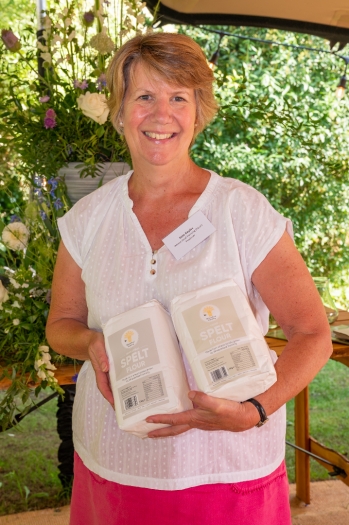Flour Power With Sustainable Spelt

Farming life has changed for Kate Baylis, one of four partners behind Wheatsheaf Farming, established nearly 20 years ago, in 2002, to grow crops on 700 hectares south of Basingstoke.
As Kate Baylis explains, “There came a time when quantity of grain at the end of each harvest could no longer be our aim. We had to start taking positive action towards a more environmentally sustainable food production system."
Farm Manager David Miller has been the leading light in changing the direction of the farm and is responsible for the practical day-to-day running of the farm.
Kate continues, "In the past all the crops were established in the conventional way by ploughing and cultivating the soil and burying weeds to produce a seedbed. We would use fertiliser and plant protection to stop pests and diseases and produce a crop.
“We now farm regeneratively: a complete change of our farming methods. We are zero till, no ploughing, use cover and companion cropping, fewer chemicals, less inorganic fertiliser, increase our natural biological inputs and create habitats. Healthy soil, healthy plants, healthy crop and healthy people has become one of our main aims.”
Wheatsheaf Farming’s focus is now on regenerative practices, growing sustainable crops; these include not only wheat and barley, but oil seed rape, rye, and spelt. The latter is an ancient grain now being sold direct from the farm.
“Farming using regenerative methods led to us growing spelt. This ancient grain fits very well with the ethos of the farm. We were first asked to grow it by the mill who milled some of our wheat and sold it on. We agreed and it was a success. Then we were given the opportunity to have our spelt dehulled, milled and returned to us under our own name.
"So, during lockdown, we designed the bag and logo, and our farm manager David Miller (who has encouraged and implented our regenerative farming practices) grows the spelt and I am responsible for retailing it. It is much more satisfying to know that what you have grown is coming back to the farm for us to retail ourselves.”
“Our spelt story only started this year so we are slowly building up contacts for both bakers and retail outlets who might be interested in our spelt flour. I am meeting all sorts of interesting people. Every day is a learning curve. We have learnt very quickly that retail is a difficult and lengthy process, while with every baker I meet I learn something new, and how bakers use spelt.
"The people who know about spelt are usually experts in grains and breadmaking, but there are many people who know nothing about spelt, so we designed a leaflet to go alongside the product telling people who we are, how we farm, what spelt is and how you can use the flour. We are also in the process of developing recipe cards to show customers how to use spelt in everyday homebaking such as pizza bases, cakes, biscuits, scones and pastry.
"The best times are when you get a message saying how wonderful it is to find a farm growing sustainable spelt flour, or a post on Instagram that says, 'My kids thought the waffles I made with your flour were the best they have ever had!'
 Kate Baylis of Wheatsheaf Farming
Kate Baylis of Wheatsheaf Farming


